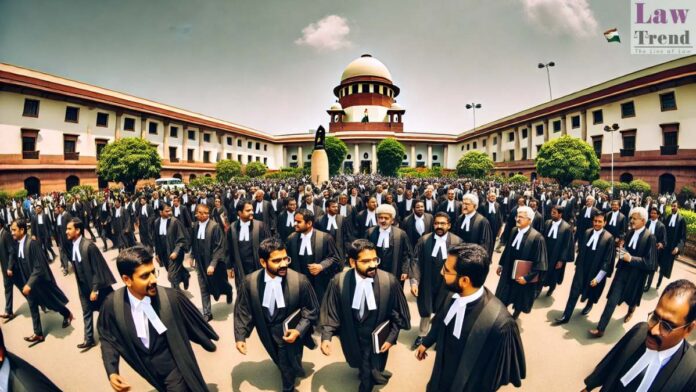The Supreme Court on Wednesday voiced apprehension over the substantial amounts of money expended in the elections for Bar Councils and Bar Associations, questioning the sources of these funds. Justices Surya Kant and Dipankar Datta, during a hearing of a suo motu case aimed at bolstering Bar bodies across India, highlighted the need for a thorough examination of the election processes.
Senior Advocate Arvind Datar drew attention to various allegations, such as arbitrary admissions to Bar associations, suggesting the need for reform. “The influx of lawyers is enormous. They aim to be part of reputable Bar associations, which raises questions about the criteria for admissions and the transparency of elections,” Datar noted.
Justice Kant responded to these remarks by questioning the financial aspects of these elections. “Currently, there is a significant outlay on elections. We need to understand where this money is sourced from and who is accountable. Additionally, the numerous election petitions challenging the outcomes suggest deeper issues,” Justice Kant expressed.
Concerns were also raised about individuals with criminal backgrounds securing positions as office bearers. “There is a need for discipline and perhaps orientation. We must consider setting minimum criteria for election eligibility, especially in light of complaints about individuals with criminal records holding office,” the Bench added.
The Court has involved the Bar Council of India (BCI), state Bar Councils, the Supreme Court Bar Association (SCBA), the Supreme Court Advocates-on-Record Association (SCAORA), and various other Bar associations as parties in this case.
In previous hearings, the Court remarked that the detachment of Bar councils and associations from political influences is essential for addressing the myriad issues plaguing lawyers today. “We are focusing on institutional reforms rather than individual grievances. Our goal is to ensure that these bodies function effectively without succumbing to internal resistance to change,” Justice Kant clarified.
The hearing concluded with Justice Kant emphasizing that the proceedings are collaborative and not adversarial. “We are invested in enhancing the profession’s stature for the long term. It’s crucial that we receive comprehensive suggestions from all parties involved,” he stated.
Also Read
The Court appointed SCAORA president Vipin Nair as the nodal counsel to gather suggestions from Bar associations, while Senior Advocate S Prabakaran will collate inputs from State Bar Councils. The next steps involve a detailed examination of these suggestions to frame uniform guidelines that could potentially reshape the governance of Bar bodies across the country.




